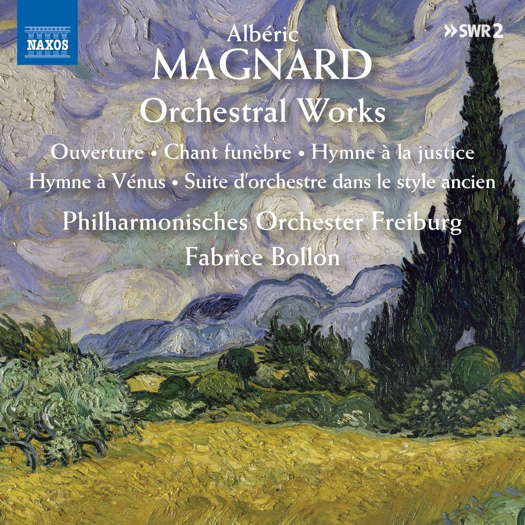- Charles Mackerras
- Long Island
- Lena McLin
- Benedikta Maria Rancigaj
- ballet music
- Alirio Díaz
- Martin Roscoe
- Julia Maynard
 VIDEO INTERVIEW: Ona Jarmalavičiūtė talks to American choral conductor Donald Nally, director of The Crossing, in this fascinating, illustrated, one hour programme.
VIDEO INTERVIEW: Ona Jarmalavičiūtė talks to American choral conductor Donald Nally, director of The Crossing, in this fascinating, illustrated, one hour programme.
 DISCUSSION: Defining Our Field - what is 'classical music' to us, why are we involved and what can we learn from our differences? Read John Dante Prevedini's essay, watch the panel discussion and make your own comments.
DISCUSSION: Defining Our Field - what is 'classical music' to us, why are we involved and what can we learn from our differences? Read John Dante Prevedini's essay, watch the panel discussion and make your own comments.

Very Palatable
GEOFF PEARCE listens to
orchestral music by Albéric Magnard
'The quality of the performances by Philharmonisches Orchester Freiburg and conductor Fabrice Bollon is exemplary and complimentary to the work of this minor master.'
Albéric Magnard (1865-1914) is a composer unknown to me, except by reputation. His output was relatively small. He was a student of Vincent D'Indy and certainly showed the same fine gift for orchestration that his teacher possessed. From what I can tell from listening to this disc, and from my forays into his symphonies, this composer needs to be heard a lot more, as he has a well-crafted command of his art and his music is very palatable.
The disc starts with a work written in 1895 entitled Ouverture, Op 10. It starts in a bold and rousing fashion but shortly after settles down to a slower more tranquil section which is full of contrast. Magnard shows immediately that he is a master of the orchestra and has a finger for melody and atmosphere. The music is never boring as he intersperses dramatic passages to contrast the more tranquil sections.
Listen — Albéric Magnard: Ouverture, Op 10
(track 1, 5:42-6:27) © 2020 Naxos Rights (Europe) Ltd :
The second work, Chant funèbre, his Opus 9, was written as a tribute upon the death of his father, with whom he had a rather complicated relationship, but nevertheless, he was very shaken with his father's death. This work moved me a lot. It is slow and brooding and one can feel the sorrow in every phrase. After the introduction, there is a beautiful passage in which a sad oboe solo soars over a rather slow descending chord movement in the lower strings and brass. This in turn gives way to a very tender and touching melody which returns to the oboe theme and is a kind of cortège. To me this is the masterpiece on this disc. It has moments of great sadness, affection and acceptance over its twelve minutes.
Listen — Albéric Magnard: Chant funèbre, Op 9
(track 2, 7:55-8:51) © 2020 Naxos Rights (Europe) Ltd :
The composer had a strong sense of justice and was an outspoken supporter of Alfred Dreyfus. This inspired him to write Hymne à la justice, Op 14 in 1902, by which time, Dreyfus had been pardoned.
The work opens in an impassioned manner, revealing the oppressive nature of injustice. This gives way to a plea for justice, which appears in vain, as the victim is cast down. Greater persecution follows, but at the end of the work, justice prevails and the work ends triumphantly and joyously. Like all the other works on this disc, the composer reveals his fine orchestra gifts, and a true gift for setting the mood.
Listen — Albéric Magnard: Hymne à la justice, Op 14
(track 3, 4:46-5:28) © 2020 Naxos Rights (Europe) Ltd :
The next work, dedicated to Magnard's wife, is Hymne à Vénus, Op 17. The composer loved his wife and family with deep affection and this work of some thirteen-and-a-half minutes bears testament to this. It is filled with tenderness and passion.
Listen — Albéric Magnard: Hymne à Vénus, Op 17
(track 4, 7:12-7:53) © 2020 Naxos Rights (Europe) Ltd :
This disc ends with the earliest work presented on this disc, his Suite d'orchestre dans le style ancient, Op 2 (1892). Prior to this work the composer had only written three piano pieces and a song. In his first attempt at writing this work, he had used the cor anglais throughout, but after showing d'Indy, decided to rewrite and reorchestrate the work into its current form. It is modelled on an eighteenth century dance suite, but this was written not too long after the Franco-Prussian war (1870-71) so the composer, instead of using the traditional opening Allemande, substituted this for a lively Française. The five movements comprising this set are short and contrasting, and certainly, one can hear echoes of the past, but certainly not as pronounced as with composers who wrote in a neoclassical style in the next century.
In the second movement, a Sarabande, the composer allows himself to retain a vestige of his early workings and gives the opening melody to the cor anglais.
Listen — Albéric Magnard: Sarabande: Mesto (Suite d'orchestre dans le style ancien)
(track 6, 0:00-0:42) © 2020 Naxos Rights (Europe) Ltd :
This is a lovely disc and well worth being included in a collection. I hope it spurs orchestras into performing this composer's works more often, and indeed many composers of La Belle Époque who are, today, largely ignored by programmers. It is a great pity that this composer was tragically killed in 1914 at the relatively early age of forty-nine, as I am sure there would have been many more masterpieces if he had lived another thirty or more years.
The quality of the performances by Philharmonisches Orchester Freiburg and conductor Fabrice Bollon is exemplary and complimentary to the work of this minor master.
Copyright © 8 June 2020
Geoff Pearce,
Sydney, Australia

CD INFORMATION - ALBÉRIC MAGNARD: ORCHESTRAL WORKS
FURTHER INFORMATION - ALBÉRIC MAGNARD


